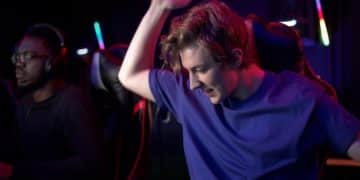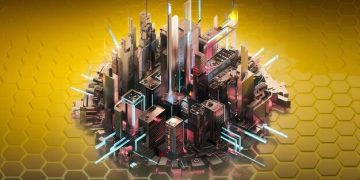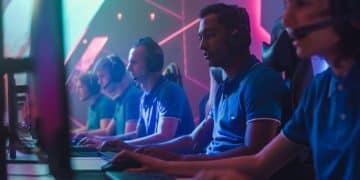US Esports Athlete Training Programs: 2025 Updates & Innovations
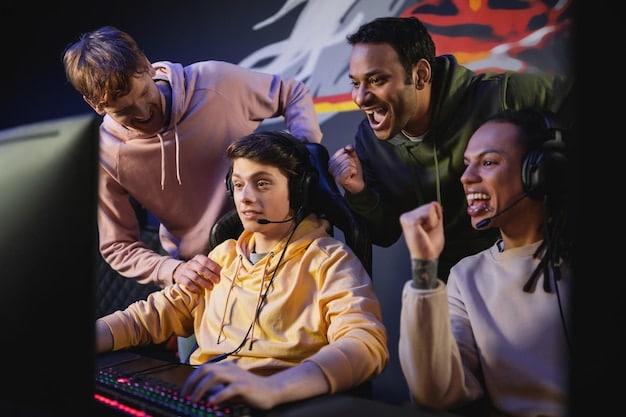
US Esports Athlete Training Programs are evolving rapidly, with a focus on holistic development including mental health, physical fitness, and advanced skill refinement for 2025.
The landscape of US Esports Athlete Training Programs is undergoing a significant transformation as we approach 2025, reflecting a growing understanding of the demands placed on professional gamers.
Evolving Paradigms in Esports Training
Esports training has moved far beyond simply practicing reaction times and game mechanics. Today’s programs recognize the importance of a holistic approach, encompassing physical fitness, mental wellbeing, and strategic thinking to optimize performance.
The integration of these elements marks a significant shift in how esports athletes are prepared for competition, addressing the unique stressors and demands they face.
The Rise of Holistic Training Models
Holistic training models are gaining traction, focusing on developing the complete athlete, not just the gamer. This involves strategies for managing stress, improving focus, and maintaining physical health.
- Physical Fitness: Tailored workout routines designed to improve stamina, reduce strain injuries, and enhance overall physical wellbeing.
- Mental Health Support: Access to sports psychologists and therapists specializing in the unique pressures of esports competition.
- Nutritional Guidance: Personalized dietary plans to optimize energy levels, cognitive function, and long-term health.
These multifaceted approaches are becoming increasingly essential as esports professionals seek sustainable and competitive careers.
In conclusion, the evolving paradigms in esports training highlight a significant move towards comprehensive athlete development, acknowledging the multifaceted demands of the profession and emphasizing sustainable peak performance.
Integrating Technology and Data Analytics
Technology and data analytics are playing a pivotal role in shaping the future of esports training. Sophisticated tools and platforms are being developed to track performance, analyze gameplay, and provide personalized feedback.
This data-driven approach allows coaches and athletes to identify strengths and weaknesses, fine-tune strategies, and monitor progress with unprecedented precision.
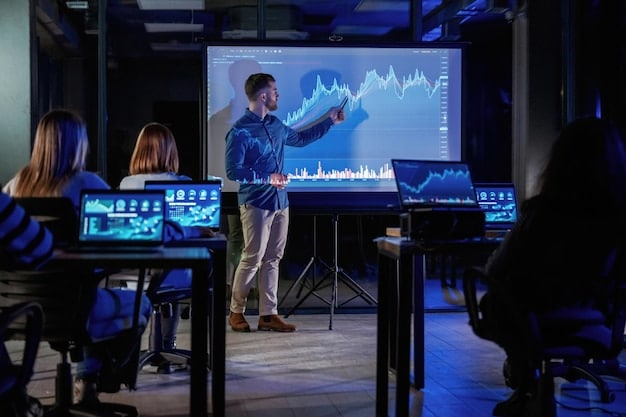
Advanced Performance Tracking Systems
Performance tracking systems are becoming increasingly sophisticated, capturing a wide range of data points during gameplay.
- Reaction Time Analysis: Measuring and improving reaction times through specialized software and hardware.
- Decision-Making Metrics: Analyzing player decisions in real-time to identify patterns and areas for improvement.
- Strategic Play Analysis: Evaluating team strategies and individual player tactics to optimize performance.
These systems provide valuable insights into player behavior, enabling targeted training interventions and personalized coaching strategies.
Through the integration of technology and data analytics, esports athletes and coaches are gaining a deeper understanding of performance dynamics, enabling more effective training strategies and driving continuous improvement.
Specialized Training Programs for Different Esports Titles
Recognizing the unique demands of different esports titles, training programs are becoming increasingly specialized to cater to the specific skill sets and strategies required for each game.
This tailored approach ensures that athletes receive targeted coaching and practice opportunities relevant to their chosen specialty, maximizing their potential for success.
MOBA (Multiplayer Online Battle Arena) Training
MOBA games like League of Legends and Dota 2 require complex teamwork, strategic thinking, and split-second decision-making. Training programs for these titles focus on:
- Team Coordination Drills: Exercises designed to improve communication, synergy, and strategic planning.
- Map Awareness Training: Developing situational awareness and understanding of map dynamics.
- Role-Specific Coaching: Tailored coaching for specific roles within the team, such as carry, support, or tank.
These specialized training components ensure that MOBA players develop the necessary skills for success in highly competitive environments.
Specialized training programs represent a targeted approach to esports education, acknowledging the varied demands of different games and offering athletes the specific tools and instruction they need to flourish in their chosen area.
The Role of Esports Academies and Training Centers
Esports academies and dedicated training centers are emerging as key hubs for talent development, providing aspiring professionals with access to state-of-the-art facilities, experienced coaches, and structured training programs.
These institutions offer comprehensive support systems designed to nurture talent and prepare athletes for the rigors of professional competition.

Structured Training Regimens
Esports academies provide structured training regimens that incorporate elements of physical fitness, mental conditioning, and in-game practice.
- Daily Practice Schedules: Regulated practice schedules designed to optimize performance and prevent burnout.
- Scrimmages and Competitive Play: Opportunities for regular sparring and competition against other aspiring professionals.
- Performance Reviews and Feedback: Comprehensive performance reviews and personalized feedback from experienced coaches.
Structured training regimens are vital for fostering discipline, maximizing performance, and paving the way for sustainable success in the esports industry.
The rising importance of esports academies and training centers underscores a growing commitment to professionalizing esports, providing aspiring athletes with structured environments and expert guidance to maximize their potential.
Navigating the Challenges of Competitive Esports
Competitive esports presents unique challenges including high-pressure environments, intense competition, and the risk of burnout or injury. Effective training programs address these challenges by equipping athletes with coping strategies and support systems.
Addressing challenges head-on makes esports more sustainable for the long term.
Burnout Prevention Strategies
Burnout is a significant concern for esports athletes, given the demands of intense practice and competition. Training programs incorporate:
- Time Management Techniques: Skills to balance practice with adequate rest and personal time.
- Stress Reduction Methods: Techniques to manage performance anxiety and maintain mental wellbeing.
- Team Support Networks: Encouragement of team camaraderie and mutual support to navigate challenges.
Burnout prevention strategies are essential for preserving athletes’ health, wellbeing, and prolonged competitive performance.
By addressing the challenges of competitive esports with targeted strategies and support systems, training programs enable athletes to better handle pressure, prevent burnout, and maintain sustainable performance over the long term.
The Future of Esports Training: Predictions for 2025 and Beyond
As esports continues to evolve, training programs will adapt to meet the changing needs of the industry. Innovations in technology, data analytics, and holistic athlete development will shape the future of esports training in 2025 and beyond.
Esports programs can continue to develop with thoughtful intention.
Virtual Reality (VR) Training Simulations
VR technology has the potential to transform esports training by creating immersive and realistic simulations of competitive scenarios.
- Enhanced Strategic Planning: VR simulations can allow athletes to practice strategies in a controlled and immersive environment.
- Improved Reaction Time Training: VR can provide realistic and dynamically changing scenarios to enhance reaction times.
- Team Coordination Exercises: VR can facilitate team training even when athletes are geographically dispersed, fostering better communication.
VR training simulations are likely to become an integral part of esports training programs, enhancing skills and strategic thinking in a safe and controlled environment.
As training continues to evolve, athletes will be better prepared for the challenges and opportunities that lie ahead.
| Key Point | Brief Description |
|---|---|
| 💪 Holistic Training | Focuses on physical, mental, and nutritional aspects for comprehensive athlete development. |
| 📊 Data Analytics | Utilizes performance tracking systems to identify strengths and weaknesses for tailored coaching. |
| 🎮 Specialized Programs | Offers title-specific training, such as MOBA drills for teamwork and strategic planning. |
| 🛡️ Burnout Prevention | Includes time management and stress reduction techniques to support athletes’ wellbeing. |
FAQ
▼
Holistic esports training encompasses physical fitness, mental health support, and nutritional guidance, ensuring athletes are well-rounded and prepared for competition. This approach focuses on the athlete, not just the game.
▼
Data analytics tracks player performance metrics such as reaction time and decision-making, offering insights for personalized coaching. This helps identify strengths and areas needing improvement.
▼
Specialized programs address the unique requirements of different esports titles. For example, MOBA training involves team coordination and role-specific coaching. This provides focused improvement and skill elevation.
▼
Esports academies offer structured training regimens, including practice schedules, scrimmages, and performance reviews. They provide a professional environment for aspiring athletes to hone their skills and prepare for competition.
▼
Burnout prevention strategies include effective time management, stress reduction techniques, and strong team support networks. Balancing practice with rest and personal time is crucial for long-term wellbeing and performance.
Conclusion
As US Esports Athlete Training Programs continue to evolve in 2025, the emphasis on holistic development, technology integration, and specialized training will undoubtedly shape the future of competitive gaming. By prioritizing the wellbeing and comprehensive skill sets of athletes, these programs are setting new standards for success in the esports industry.
